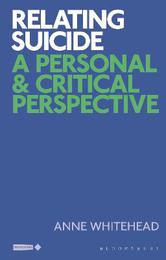
|
Relating Suicide: A Personal and Critical Perspective
Hardback
Main Details
| Title |
Relating Suicide: A Personal and Critical Perspective
|
| Authors and Contributors |
By (author) Anne Whitehead
|
| Series | Critical Interventions in the Medical and Health Humanities |
|---|
| Physical Properties |
| Format:Hardback | | Pages:128 | | Dimensions(mm): Height 216,Width 138 |
|
| Category/Genre | Literary theory
Philosophy of the mind |
|---|
| ISBN/Barcode |
9781350192157
|
| Classifications | Dewey:362.28 |
|---|
| Audience | | Tertiary Education (US: College) | |
|---|
| Illustrations |
5 b/w illus
|
|
Publishing Details |
| Publisher |
Bloomsbury Publishing PLC
|
| Imprint |
Bloomsbury Academic
|
| Publication Date |
9 February 2023 |
| Publication Country |
United Kingdom
|
Description
Writing against the prevailing narrativization of suicide in terms of why it happened, Whitehead turns instead to the questions of when, how, and where, calling attention to suicide's materiality as well as its materialization. By turns provocative and deeply affecting, this book brings suicide into conversation with the critical medical humanities, extending beyond individual pathology and the medical institution to think about subjective and social perspectives, and to open up the various sites, scenes and interactions with which suicide is associated. Suicide is related forward from the point of death, rather than taking a retrospective view. Combining critical and textual analysis with personal reflection based on her own experience of her sister's suicide, Whitehead examines the days, months, and years following a death by suicide. This pivoting of attention to what happens in the wake of suicide brings to light the often-surprising ways in which suicide is woven into the everyday places that we inhabit, and in which it is related to all of us, albeit with varying degrees of proximity and kinship.
Author Biography
Anne Whitehead is Professor in Modern and Contemporary Literature at Newcastle University, UK. She is the author of Trauma Fiction (2004), Memory: New Critical Idiom (2008) and Medicine and Empathy in Contemporary British Fiction (2017) and she was co-editor of The Edinburgh Companion to the Critical Medical Humanities (2016)
ReviewsThe taboos surrounding suicide run deep. I couldn't speak about my brother's death for over a decade. This poignant book creates a space to challenge and rethink our own perceptions of suicide and mental health - both as individuals, and as a society as a whole. * Orlando von Einsiedel, Filmmaker * Weaving personal experience together with extensive research, Relating Suicide bears witness to what it means to live beside suicide. It calls for the need to not only talk more about suicide, but also to listen more to a diversity of voices, and to accommodate for what resides between what we can and cannot know about suicide. This is an absolute must read for students and researchers focusing on the topic of suicide and for those who work in suicide prevention and want to understand suicide in more expansive terms. * Katrina Jaworski, Senior Lecturer in Cultural Studies, University of South Australia * With her own sister's death as poignant provocation, Anne Whitehead attends to the materiality of suicide's aftermath and makes a compelling contribution to the emerging field of critical suicide studies. A watch, a coroner's court room, a stretch of seaside beach, a memorial bench become the objects and spaces that allow her to sit with the everyday and ongoing presence of suicide without trying to explain or prevent it. Through deeply felt and creative forms of thinking and writing, Whitehead gently but forcefully forges a path for us to relate to suicide rather than turning away from it. -- Ann Cvetkovich, Professor, Feminist Institute of Social Transformation, Carleton University, Ottawa, Canada This is a wonderful book. Entirely original, beautifully written, hugely wide ranging. At last a serious and profound engagement with what comes after suicide: the extraordinary disturbances of time and perception for those remaining; the mundane and often forgotten judicial, religious and cultural processes that have sought to contain and circumscribe an event; the historical and ongoing resonances and effects of stigmatisation. Lyrical, analytic, philosophical and factual, this is also achieves that very difficult feat of being personal without being confessional and of being philosophical and political without relegating the profoundly experiential. -- Pat Waugh, Professor Emeritus, Durham University, UK
|